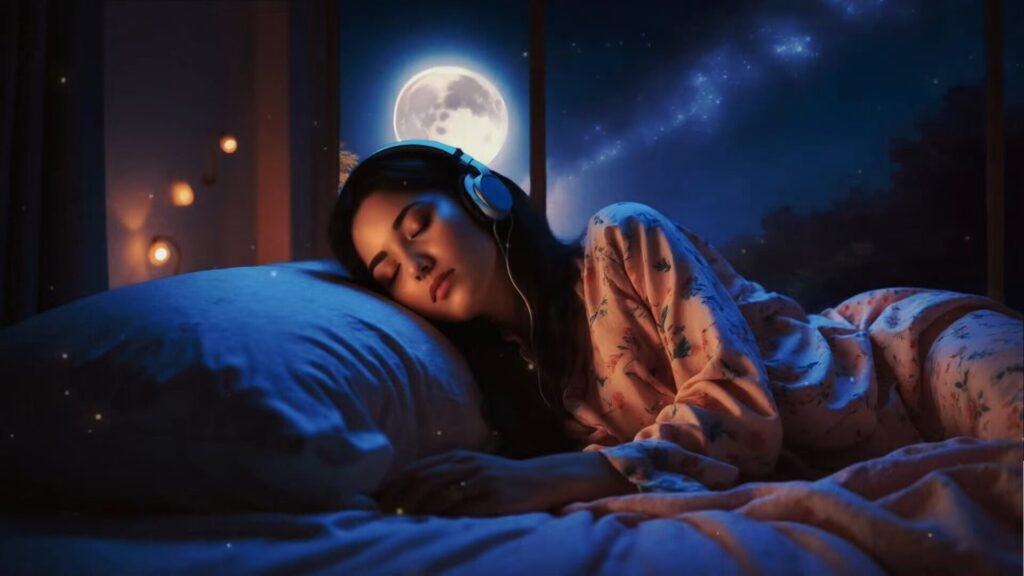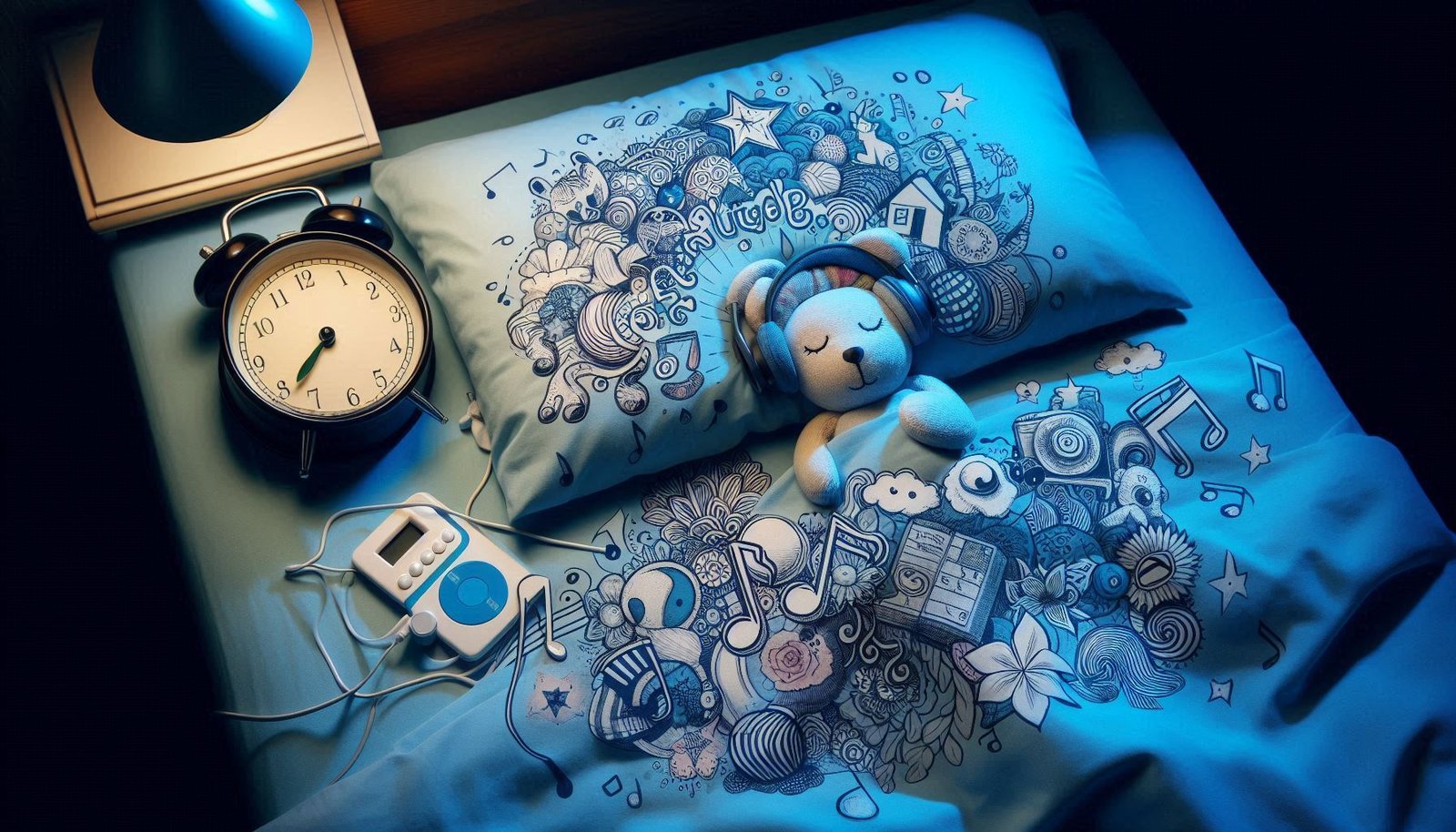
Getting a good night’s sleep is essential for overall health and well-being, but many people struggle with insomnia or poor sleep quality. One increasingly popular method to improve sleep is using music. The connection between music and sleep has been studied extensively, revealing that certain types of music can have a calming effect on the mind and body, helping people fall asleep faster and enjoy deeper, more restorative rest. In this article, we will explore the benefits of music for improving sleep quality and how you can use it effectively.
1. How Music Affects the Brain During Sleep
Music has a profound impact on the brain, particularly when it comes to relaxation and sleep. Listening to music before bed can trigger the parasympathetic nervous system, which is responsible for slowing the heart rate, reducing blood pressure, and promoting relaxation. This state of calm is ideal for drifting into sleep.
Certain types of music can also increase the production of dopamine, a neurotransmitter associated with pleasure and relaxation. Additionally, melatonin, the hormone that regulates sleep, is often produced in higher amounts when we listen to soothing music, making it easier to fall asleep.
Key Point:
- Music activates the parasympathetic nervous system, helping the body relax and prepare for sleep.
2. Music Reduces Stress and Anxiety
One of the most common reasons people struggle to sleep is stress and anxiety. Music has been shown to be an effective tool for reducing these feelings. Relaxing music—typically slow-tempo with low frequencies—can lower cortisol levels, the hormone associated with stress. As cortisol decreases, feelings of tension ease, allowing the body and mind to transition into a more restful state.
Listening to calming music also helps to distract the brain from racing thoughts or worries, which is particularly beneficial for those who suffer from anxiety-induced insomnia.
Key Point:
- Music reduces cortisol levels, easing stress and anxiety, which improves the chances of falling asleep quickly.
3. The Role of Rhythm and Tempo in Sleep
Not all music is created equal when it comes to sleep. The rhythm and tempo of the music you choose play a significant role in its effectiveness. Slow-tempo music, generally between 60 to 80 beats per minute (BPM), closely mirrors the resting heart rate. This can help synchronize your body with the music, making it easier to relax and fall asleep.
Upbeat, fast-paced music, on the other hand, can have the opposite effect, stimulating the brain and making it harder to wind down. Therefore, choosing slower, more soothing tunes is key to using music as a sleep aid.
Key Point:
- Slow-tempo music (60-80 BPM) can help the body relax and align with the ideal heart rate for sleep.
4. Music Helps Improve Sleep Disorders
For people who suffer from sleep disorders like insomnia, sleep apnea, or restless leg syndrome, music can be a useful non-pharmacological intervention. Research has shown that listening to music before bed can improve sleep quality, decrease the time it takes to fall asleep, and extend the duration of sleep in people with sleep disorders.
Music is particularly beneficial because it helps the brain focus on external sounds rather than internal anxieties, which can disrupt sleep patterns. Incorporating a nightly music routine can act as a natural sedative, helping regulate the sleep-wake cycle for those with chronic sleep issues.
Key Point:
- Music has been shown to help people with sleep disorders fall asleep faster and enjoy better-quality sleep.
5. Music and REM Sleep
The effects of music on Rapid Eye Movement (REM) sleep, the phase of sleep most associated with dreaming, are also noteworthy. REM sleep is crucial for cognitive functions like memory consolidation, emotional regulation, and brain restoration. Studies indicate that people who listen to music before falling asleep may spend more time in REM sleep, which can lead to a more restful and rejuvenating night’s rest.
By promoting relaxation and reducing stress, music enables a smoother transition into the deeper stages of sleep, including REM, resulting in more restorative sleep.
Key Point:
- Music can enhance the quality of REM sleep, helping with cognitive function and emotional health.
6. Music as a Sleep Routine
Creating a consistent sleep routine is one of the best ways to improve sleep quality, and incorporating music into this routine can make it even more effective. Listening to the same playlist or type of music each night signals to your brain that it’s time to wind down, establishing a pattern of relaxation before sleep. This routine can help train the brain to associate music with sleep, making it easier to drift off.
For the best results, keep your bedtime music routine consistent. Dim the lights, put away your phone or electronic devices, and let the soothing sounds guide you into a peaceful slumber.
Key Point:
- Incorporating music into your bedtime routine helps condition the brain to relax and prepare for sleep.
7. What Type of Music is Best for Sleep?
When it comes to choosing the right music for sleep, it’s important to select music that is soothing, slow, and free from sudden changes in tempo or volume. Some of the most effective genres for improving sleep include:
- Classical music: Pieces from composers like Chopin, Debussy, or Satie are commonly used for relaxation due to their gentle tempos and calming melodies.
- Ambient music: This genre is characterized by its atmospheric and repetitive sounds, which can create a peaceful environment for sleep.
- Nature sounds: While not strictly music, recordings of rainfall, ocean waves, or forest sounds are commonly used to create a calming soundscape conducive to sleep.
- Instrumental music: Avoiding lyrics can be beneficial, as words can engage the brain and prevent relaxation. Soft instrumental tracks with piano, strings, or acoustic guitar are ideal.
The most important thing is to find music that you personally find relaxing. Everyone has different tastes, so what works for one person may not work for another.
Key Point:
- Classical, ambient, and instrumental music are among the best genres for improving sleep quality.
8. The Science Behind Personalized Sleep Playlists
One interesting development in the relationship between music and sleep is the rise of personalized sleep playlists. Apps and music streaming platforms now offer sleep-oriented playlists curated based on individual preferences, sleep habits, and even biometric data like heart rate.
These playlists are designed to provide tailored music that aligns with your body’s unique needs for relaxation. Some platforms even incorporate binaural beats, a type of auditory illusion that can promote relaxation by synchronizing brain waves with the frequency of the music.
Key Point:
- Personalized sleep playlists are becoming more popular, using tailored music to optimize relaxation and improve sleep.
9. Music and Sleep in Different Age Groups
Music’s ability to improve sleep quality isn’t limited to adults—it can be beneficial for all age groups. Infants and toddlers often fall asleep faster and enjoy more restful sleep when lullabies or soft background music is played. For teenagers and adolescents, who often struggle with sleep due to hormonal changes and increased stress, relaxing music can act as a natural remedy for insomnia.
Even for older adults, who may experience sleep disruptions due to aging or medical conditions, music has been shown to improve both the quality and duration of sleep.
Key Point:
- Music is an effective sleep aid for people of all ages, from infants to older adults.
Conclusion: Music as a Natural Sleep Aid
The connection between music and sleep is well-established, with numerous studies showing that music can reduce stress, improve relaxation, and help regulate the body’s sleep cycles. By incorporating slow, soothing music into your bedtime routine, you can enhance your sleep quality and wake up feeling more rested and refreshed.
Whether you’re struggling with insomnia, seeking to improve the quality of your sleep, or simply looking for a way to relax before bed, music offers a natural, non-invasive solution. So, put on your favorite calming playlist tonight and let the power of music lull you into a peaceful slumber.
